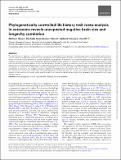Phylogenetically controlled life history trait meta-analysis in cetaceans reveals unexpected negative brain size and longevity correlation
Abstract
The identification of patterns in trait evolution is essential to understand the interaction of evolutionary forces, and provides useful information for species management. Cetaceans are a phylogenetically well-resolved infraorder that exhibit distinct trait variation across behavioural, molecular and life history dimensions, yet few researchers have applied a meta-analytic or comparative approach to these traits. To understand cetacean trait evolution, we used a phylogenetic generalised least squares approach to examine the cognitive buffer hypothesis (CBH). A large brain should buffer individuals against environmental challenges through increasing survival rates, and a longer lifespan should buffer individuals against the cost of extended development for larger brains according to the CBH, leading to an expected positive correlation between brain size and lifespan. In contrast to this expectation, previously observed in taxa including primates, we found a negative correlation between brain size and lifespan in cetaceans. This suggests cetaceans experience selective pressures different from most other mammals in these traits but may be more similar to some social mammalian carnivores that display alloparenting. We also provide a comprehensive dataset to explore additional aspects of trait evolution but which would greatly benefit from studies on behavioural ecology across cetaceans and increased focus on data deficient species.
Citation
Groot , N , Constantine , R , Garland , E C & Carroll , E L 2023 , ' Phylogenetically controlled life history trait meta-analysis in cetaceans reveals unexpected negative brain size and longevity correlation ' , Evolution , vol. 77 , no. 2 , qpac050 . https://doi.org/10.1093/evolut/qpac050
Publication
Evolution
Status
Peer reviewed
ISSN
0014-3820Type
Journal article
Description
Funding: ELC was supported by a Rutherford Discovery Fellowship from the Royal Society of New Zealand Te Apārangi and EG was supported by a University Research Fellowship from the Royal Society of London.Collections
Items in the St Andrews Research Repository are protected by copyright, with all rights reserved, unless otherwise indicated.

